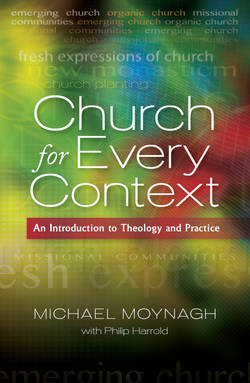Читать книгу Church for Every Context - Michael Moynagh - Страница 17
На сайте Литреса книга снята с продажи.
Scope of the book
ОглавлениеThe purpose of Church for Every Context is to introduce the theology and practice of new contextual churches, drawing on recent British experience. Various rationales for these types of church can be found, for example in Frost and Hirsch (2003), Mission-shaped Church (2004) and in the writings of Stuart Murray (for example 2004a and 2004b). But there have also been fierce criticisms, mainly by the writers referred to at the beginning of the chapter. These criticisms reveal a need to articulate a fuller theological justification – not least, of the understanding that these initiatives are church.
Though further theological work is needed, one aim of the book is to provide this defence. The book will address a number of concerns, which will be described more fully, including:
Do these new communities express a full view of the kingdom?
Can they be regarded as churches?
Do they reflect a proper understanding of the missio Dei?
In seeking to be contextual, are they also staying faithful to the gospel?
Can their focus on specific cultural groups be justified?
What is their relationship to the Christian tradition?
Are these contextual churches growing disciples with a sense of obligation to the wider church and to others in society, or are they just a form of spiritual consumerism?
Will they prove sustainable?
What should be their relationship to the denominations?
A second aim is to contribute to reflection on the practice of contextual churches. The church planting literature, most of which comes from North America, contains a great deal of wisdom. Yet much of it arises from the experience of church planting among existing, but disillusioned churchgoers or among recent church-leavers. In many parts of the global North, such people are a rapidly shrinking proportion of the population. The Church faces a new mission context, in which steadily more people have little or no Christian background.
A number of observers, such as Brian McLaren (2009, p. 17), have claimed that by supporting fresh expressions of church, Britain’s denominations are ahead of the rest of the global North in addressing this situation. To many of us in the UK, however, it looks as if we have much to learn from other countries. As part of this mutual learning, there may be lessons from British experience that are worth not only debating in the UK but sharing more widely.
